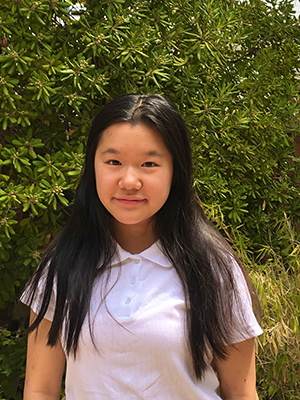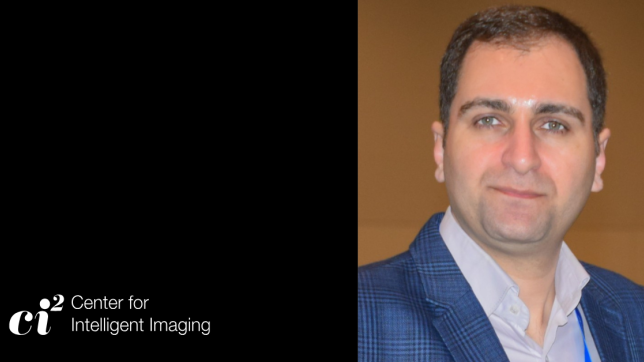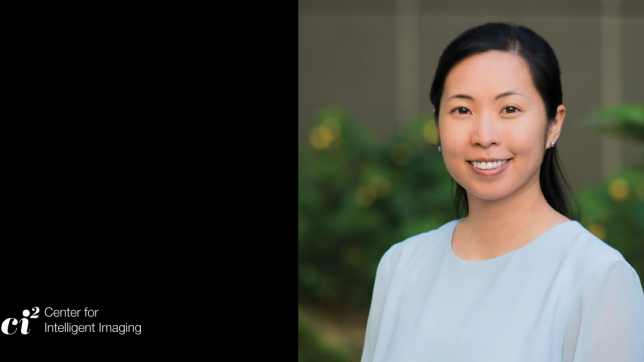Each summer, the UCSF Center for Intelligent Imaging (ci2) welcomes interns from high school, undergraduate and graduate school, chosen based on their background, a graded rubric and overall readiness. Meet Emily Xie – an intern who is participating in the program for the second year.

Before starting this internship in summer 2020, Emily knew that she liked the individual subjects of computer science and medicine. "I'd attempted various programming projects, and I'd also shadowed my dentist the previous summer," she says. "As I searched for summer activities that corresponded to these two interests, I found the ci2 program and learned that it actually combined them. I was very excited to see this great fit, I knew I had to apply."
In her first year, Emily worked with Yan Li, PhD, UCSF ci2 member and assistant professor at UCSF Radiology and Huawei Liu, PhD, postdoctoral fellow, on a project involving deep learning and magnetic resonance spectroscopic imaging (MRSI).
"MRSI is a noninvasive imaging technique like MRI, but with an extra time/frequency dimension that lets you see many types of different molecules within one 3-D voxel," she says. "I developed a machine learning pipeline that quickly identifies good quality and bad quality voxels, automating a manual quality control method that often takes hours to complete."
After she wrapped up her summer 2020 internship, Dr. Li's Multimodal Metabolic Brain Imaging Lab further developed Emily's project, presented the results at the International Society for Magnetic Resonance in Imaging (ISMRM) conference, and it is now in the process of becoming a paper.
This year, Emily decided to come back for a second summer. "The first year of this internship was a huge learning experience for me, not just in technical aspects like data analysis and python programming, but also in the process of researching itself — reading literature, presenting results, etc.," she says. "In this upcoming field of medicine and artificial intelligence (AI), I knew there was still much left to learn and discover, so I came back for a second year."
This summer, Emily switched her focus from analyzing brain data to analyzing musculoskeletal data and she is working with Valentina Pedoia, PhD, UCSF ci2 member and assistant professor at UCSF Radiology and Kenneth Gao, graduate student research in the UC Berkeley-UCSF Joint Graduate Program in Bioengineering. "Specifically, I am analyzing the meniscus, a soft tissue that sits between the femur and tibia (the two leg bones). When the bone cartilage and menisci start changing shape and eroding away, it leads to osteoarthritis (OA), a very costly and common joint disease," she says. "For this summer, I am using statistical shape modeling (SSM) to see if meniscus shape is correlated to the incidence of OA. A very exciting part of this project is that I'm using data from the OA Initiative, a dataset with orders of magnitude times more data than what was previously included in studies of this subject."
Emily and her fellow interns will present their projects virtually at the upcoming 2021 Radiology and ci2 Summer Symposium on Friday, August 6. More details to follow.
Overall, Emily is very interested in AI and AI in medicine. "At the essence, AI is just a bunch of numbers going through a bunch of equations. I'm amazed at how this simple and rather monotonous process can eventually transform into an abstract conclusion of humanity (or in some cases, a label that means 'dog')," she says. "The recent advances in AI, paired with the vast collection of health information, create countless opportunities to tackle challenging health issues, such as cancer and COVID-19, by using the power of these many numbers."
What's next for Emily? She hopes to explore potential career paths in college before deciding. "That said, after this UCSF internship, I know that researching the intersection between AI and medicine is definitely a great possibility to venture into," she says.
The Education Pillar within the UCSF ci2 works with aspiring and future scientists and physicians to mentor them and fully develop their interest in AI technology in medicine. Learn more.



